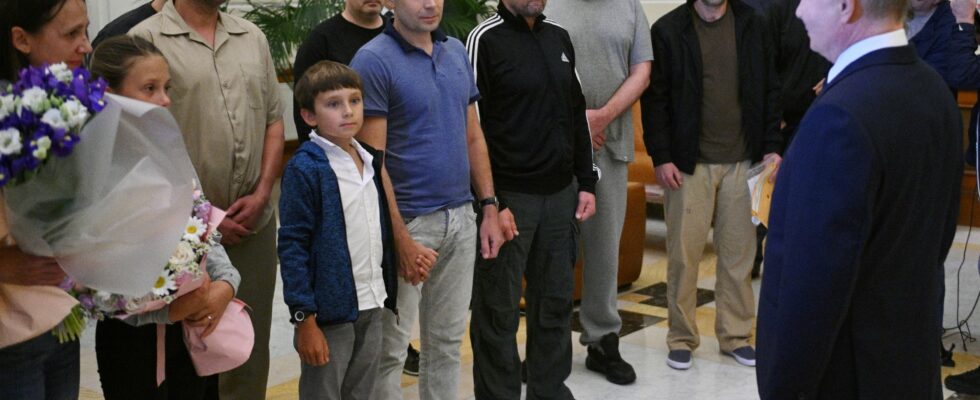The release of the American, German and Russian hostages seems to have a bitter taste across the Rhine, where the government is facing initial attacks after agreeing to release Vadim Krassikov. The latter was sentenced in 2021 to life imprisonment for the murder, two years earlier, in the heart of Berlin, of a former Chechen separatist commander on the orders of Moscow. This elite FSB agent is one of eight Russian nationals released in exchange for the release of 26 people from Russian and Belarusian cells – including American journalist Evan Gershkovich.
But was it worth it? Some of the German press sees it as a diplomatic victory for Russia. For the highly regarded daily Frankfurter Allgemeine Zeitung, taken back by International mail, “Putin wanted to get his assassin back at all costs.” The media outlet spoke of a “fatal error” likely to encourage the Russian head of state to continue on the same path. In the same vein, Image, Germany’s most widely read daily newspaper, for its part, reports a “return of the Cold War” and a “perverse message” sent to the Russian people.
Some newspaper columnists have also spoken out against the decision. With this agreement, writes Silke Bigalke in the liberal newspaper South German newspaperVladimir Putin was able to emphasize “what his propaganda has been instilling in the Russians for years: that Europe has submitted to the will of Washington. If the Americans exert enough pressure, the Germans will even release prisoners like Krasikov.”
“Sometimes you have to make a deal with the devil”
Even released Russian dissidents have criticized the process. They say they never asked to be sent back from their country and believe that the compromise could encourage the Kremlin leader to take new “hostages.” Russian dissident Vladimir Kara-Murza called it “a drop in the ocean” and said he was illegally expelled from his country because it was without his consent. “No one asked for our consent. We were taken out of prison, put on a bus, put on a plane and sent to Ankara,” he lamented.
For his part, Chancellor Olaf Scholz hammered home that it was a “difficult decision”, which “was not taken lightly” but which he considers “right”. It was he who welcomed behind closed doors the five German and Russian-German citizens who were part of the exchange, upon their arrival at Cologne airport. “Many feared for their health and also for their lives, it must be said”, he added. “Sometimes you have to make a pact with the devil”, agreed the chairman of the Foreign Affairs Committee of the German House of Representatives, Michael Roth, a member of Olaf Scholz’s party.
Meanwhile, US President Joe Biden publicly expressed his “great gratitude” to Olaf Scholz for the “significant concessions” made in the diplomatic compromise. He revealed that Berlin had “initially” rejected the release of the suspected Russian agent who had been convicted, before finally giving the green light. It should be noted that this release deviates from the German practice according to which politicians do not interfere in judicial decisions.
German public prosecutor’s office opposes release
The release of Vadim Krassikov has thus created a stir within the German government, between the chancellery and the Ministry of Justice, which had to order the measure to the public prosecutor, claims the German television channel NTV. The attorney general in charge of the case had put forward “very significant arguments” in favor of Vadim Krassikov’s sentence being carried out to its term, a spokesperson for the Ministry of Justice, Marie-Christine Fuchs, told AFP.
The daily life FAZ also speaks of a feeling of “disillusionment” within the German federal prosecutor’s office, where the impression prevails that Vladimir Putin has ceded power. While the release of Vadim Krassikov was at the heart of the Kremlin’s demands in the negotiations, the German branch of Amnesty International judged that the concessions made by Berlin left “a bitter taste” and constituted “a step towards the extension of judicial impunity” for Moscow.
The family of the Chechen veteran murdered in 2019 in Berlin called the German government’s decision “overwhelming.” “We are very disappointed that there seems to be no law in the world,” they said. “This man killed someone here and then returned to Russia for a welcoming ceremony with this huge red carpet. It was unfair,” his brother Zurab Khangoshvili told the American daily. The New York Times.
Poles wonder what they have gained
The exchange was also mocked in Poland. The opposition Law and Justice (PiS) party criticized the government for not including Andrzej Poczobut, a Polish journalist imprisoned in Belarus, the American website reports. PoliticoAs part of the exchange, Warsaw released Pavel Rubtsov, also known as Pablo Gonzales, a Spanish-Russian journalist. He had been arrested in February 2022 near the border with Ukraine and accused of being a Russian intelligence agent.
In return, no Poles were released. Mariusz Kamiński, a former coordinator of the special services under the previous PiS administration, wrote on X that the government of Polish Prime Minister Donald Tusk “gave its most valuable agent to the Russians without getting anything in return.” But this gesture is explained by the fact that the United States is one of Poland’s closest political and military allies. Enough to make some people grind their teeth…
